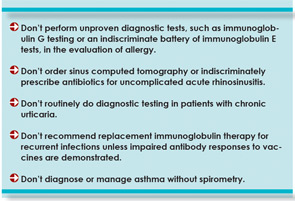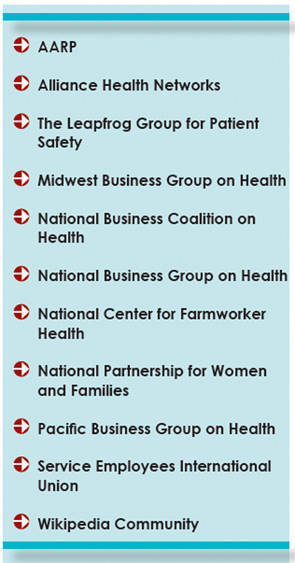The American Academy of Otolaryngology-Head and Neck Surgery (AAO-HNS) plans to join a campaign launched by the American Board of Internal Medicine (ABIM) Foundation that aims to reduce unnecessary medical tests and procedures. According to the ABIM, the campaign, “Choosing Wisely,” is an ongoing effort to encourage physicians to more actively engage in and take responsibility for ensuring the appropriateness of healthcare services offered based on the individual needs of patients.
Explore This Issue
June 2012The campaign began last year, and this April it released its first list of 45 overused or unnecessary tests and procedures as identified by nine specialty societies.
The AAO-HNS intends to publish its own list by the fall of 2012. According to David R. Nielsen, MD, executive vice president and CEO of AAO-HNS, the list will be developed by practicing otolaryngologists and head and neck surgeons with appropriate recognition of individual physician judgment, skill and responsibility to patients.
“The ‘Choosing Wisely’ campaign complements the Academy’s quality agenda that focuses on empowering physicians to provide the best patient care through the development of evidence-based guidelines as well as identifying tools, services and processes that lead to safe care in our specialty,” he said. He added that the campaign is not about telling physicians what to do but about asking the right questions.
“It’s about physicians with patients choosing the best care that is supported by evidence,” he said.
AAAAI Recommendations
The American Academy of Allergy, Asthma and Immunology (AAAAI) was among the specialty societies that initially submitted a list of five tests or procedures identified as potentially unnecessary or overused. It recommends:
- Don’t perform unproven diagnostic tests, such as immunoglobulin G testing or an indiscriminate battery of immunoglobulin E tests, in the evaluation of allergy.
- Don’t order sinus computed tomography or indiscriminately prescribe antibiotics for uncomplicated acute rhinosinusitis.
- Don’t routinely perform diagnostic testing in patients with chronic urticaria.
- Don’t recommend replacement immunoglobulin therapy for recurrent infections unless impaired antibody responses to vaccines are demonstrated.
- Don’t diagnose or manage asthma without spirometry.
Holly Boyer, MD, an assistant professor of otolaryngology at the University of Minnesota Medical School in Minneapolis who isn’t involved in the campaign, said the guidelines are on target and confirm what she already does in clinical practice. Her only caveat, she said, is that the list does not go one step further and emphasize the potential harms of unnecessary tests and procedures. “Not only does this campaign reduce the number of unnecessary tests and procedures, but it also will reduce the side effects of unnecessary tests and procedures,” she said.
Joining the Campaign
According to Linda Cox, MD, president-elect of AAAAI, the five items on the list submitted were chosen by a core workgroup, the members of which relied on selected experts and member input as well as evidence from previously vetted and published guidelines.
“What this list does is tease out the key points from already well-vetted guidelines to get this out to other specialties and to the lay public,” she said, adding that creating a list like this that is easily accessible to the public could be built into the development process of future guidelines.
The list was developed based on the directive by the ABIM foundation to choose “five things physicians and patients should question.” The directive was designed to ferret out those tests and procedures that are commonly used but may not always be necessary, as well as to emphasize the importance of physicians and patients working together to ensure that the most appropriate care is chosen and delivered.
Along with the AAO-HNS, an additional seven specialty societies have recently signed on and will be submitting their own lists (see Specialty Societies Participating in “Choosing Wisely” Campaign).
Impact on Clinical Practice
Dr. Cox said most of the five items listed by the AAAAI may be better directed at primary care physicians and other physicians who see patients on the front lines of health care. She noted the first item on the list in saying, “We [allergists] see a lot of patients coming to us with a battery of tests that might not have been directed by clinical history,” she said. “That becomes a problem with food testing because the patients come in and you’ll have a battery of positive food tests that aren’t clinically relevant to the patient.”
She also highlighted the second item, which discourages the use of antibiotics for uncomplicated acute rhinosinusitis, saying that this item may provide some comfort to physicians who are trying to get patients to wait and see before treating.
The evidence for this item came from the 2007 AAO-HNS guidelines, the most recent guideline at the time the list was drafted (Otolaryngol Head Neck Surg. 137:365-377), she said. Since then, a more recent guideline on sinusitis, published by the Infectious Diseases Society of America (IDSA), recommends treating acute sinusitis immediately if it is determined to be bacterial (Clin Infect Dis. 2012; doi: 10.1093/cid/cir1043).
She added that although the AAAAI recommendation based on the AAO-HNS guideline appears to contradict the newly published IDSA recommendation, she doesn’t think that is the case, because only 1 percent of acute cases of bronchosinusitis are determined to be bacterial. “You really have to be familiar with the two guidelines to see that this is not contradictory,” she said.
Although the stated aim of the campaign is to improve the quality and safety of patient care, Dr. Cox said that early in the development process there was concern that the lists could potentially be misperceived to be about, or to lead to, rationing care. Dr. Cox emphasized, however, that the campaign is about wiser use of the care and resources currently available.
Getting the Word Out
Consumer Reports is working with the ABIM Foundation and specialty societies to get the word out to the public. As part of that effort, easy-to-read summaries describing specific tests or procedures identified by each specialty are being created to help educate patients. A summary on treating sinusitis, for example, has already been posted to the Consumer Reports’ website (consumerreports.org). Additional summaries are in the works and will be posted in both English and Spanish.
As of the April campaign launch, 11 consumer-oriented organizations have signed on to help educate patients on making wise decisions about their health care based on currently published specialty lists.
Dr. Boyer said this emphasis on patient education will help physicians reduce the prescription of common but unnecessary tests or procedures. “What I like about this campaign is that the focus is on educating patients and not just physicians,” she said. “It is a two-way street between physician and patient, and if the patient is aware of some of these things, it will make the conversation we have with them more effective.”


Leave a Reply